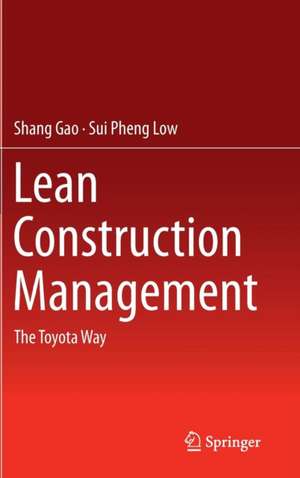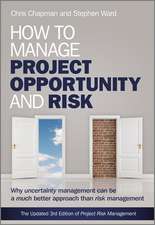Lean Construction Management: The Toyota Way
Autor Shang Gao, Sui Pheng Lowen Limba Engleză Hardback – 12 iun 2014
| Toate formatele și edițiile | Preț | Express |
|---|---|---|
| Paperback (1) | 1200.30 lei 6-8 săpt. | |
| Springer Nature Singapore – 27 sep 2016 | 1200.30 lei 6-8 săpt. | |
| Hardback (1) | 1241.58 lei 6-8 săpt. | |
| Springer Nature Singapore – 12 iun 2014 | 1241.58 lei 6-8 săpt. |
Preț: 1241.58 lei
Preț vechi: 1514.13 lei
-18% Nou
Puncte Express: 1862
Preț estimativ în valută:
237.65€ • 258.23$ • 199.76£
237.65€ • 258.23$ • 199.76£
Carte tipărită la comandă
Livrare economică 21 aprilie-05 mai
Preluare comenzi: 021 569.72.76
Specificații
ISBN-13: 9789812870131
ISBN-10: 981287013X
Pagini: 412
Ilustrații: XXI, 390 p. 38 illus., 14 illus. in color.
Dimensiuni: 155 x 235 x 28 mm
Greutate: 7.39 kg
Ediția:2014
Editura: Springer Nature Singapore
Colecția Springer
Locul publicării:Singapore, Singapore
ISBN-10: 981287013X
Pagini: 412
Ilustrații: XXI, 390 p. 38 illus., 14 illus. in color.
Dimensiuni: 155 x 235 x 28 mm
Greutate: 7.39 kg
Ediția:2014
Editura: Springer Nature Singapore
Colecția Springer
Locul publicării:Singapore, Singapore
Public țintă
Professional/practitionerCuprins
Introduction.- Production Management.- Lean Production and Construction.- The Toyota Way.- Theoretical and Conceptual Framework.- China’s Construction Industry.- Research Methodology.- Survey Data Analysis.- Interview Findings.- Case Study.- Discussion and Validation.- Conclusions.
Notă biografică
Dr Gao Shang is a Lecturer in Construction Management at the University of Newcastle (UoN), Singapore Campus. He teaches various subjects for the Construction Management (Building) Programme jointly offered by UoN and the Building & Construction Authority (BCA), Singapore. He is also a faculty associate at the School of Science &Technology, SIM University (Singapore) since 2012. His research interests are in the area of lean construction, the Toyota Way and continuous improvement in construction. He holds a PhD degree from National University of Singapore and a MSc degree from Loughborough University in the UK.
Dr Low Sui Pheng is presently Professor of Building in the School of Design and Environment, National University of Singapore where he has previously served as Head and Vice‐Dean. He teaches construction project management and has published, researched and consulted extensively both in Singapore and overseas. A Fellow of the Chartered Institute of Building, he holds a DSc degree from the University of Birmingham and a PhD degree from University College London. He currently serves as Director for the Centre for Project Management and Construction Law.
Dr Low Sui Pheng is presently Professor of Building in the School of Design and Environment, National University of Singapore where he has previously served as Head and Vice‐Dean. He teaches construction project management and has published, researched and consulted extensively both in Singapore and overseas. A Fellow of the Chartered Institute of Building, he holds a DSc degree from the University of Birmingham and a PhD degree from University College London. He currently serves as Director for the Centre for Project Management and Construction Law.
Textul de pe ultima copertă
The book presents a mixed research method adopted to assess and present the Toyota Way practices within construction firms in general and for firms in China specifically. The results of an extensive structured questionnaire survey based on the Toyota Way-styled attributes identified were developed, and data collected from building professionals working in construction firms is presented. The quantitative data presented in the book explains the status quo of the Toyota Way-styled practices implemented in the construction industry, as well as the extent to which these attributes were perceived for lean construction management. The book highlights all the actionable attributes derived from the Toyota Way model appreciated by the building professionals, but alerts the readers that some attributes felled short of implementation. Further findings from in-depth interviews and case studies are also presented in the book to provide to readers an understanding how these Toyota Way practices can be implemented in real-life projects. Collectively, all the empirical findings presented in this book can serve to enhance understanding of Toyota Way practices in the lean construction management context. The readers are then guided through to understand the gaps between actual practice and Toyota Way-styled practices, and the measures that they may undertake to circumvent the challenges for implementation. The book also presents to readers the SWOT analysis that addresses the strengths, weaknesses, opportunities, and threats towards the implementation of the Toyota Way in the construction industry. The book prescribes the Toyota Way model for use in construction firms to strategically implement lean construction management. The checklist presented in the book enables readers to draw lessons that may be used additionally as a holistic assessment tool for measuring the maturity of firms with respect to their Toyota Way implementation. Consequent to this, management would then be in a better position to develop plans for Toyota Way implementation by focusing on weak areas, strengthening them, and thus increasing the likelihood of success in the implementation of the Toyota Way. In a nutshell, this book provides a comprehensive and valuable resource for firms not only in the construction industry but also businesses outside of the construction sector to better understand the Toyota Way and how this understanding can translate to implementation of lean construction/business management to enhance profitability and survivability in an increasingly competitive global market place.
Caracteristici
First book that addresses the Toyota Way practices in the construction industry to achieve lean construction management Presents a conceptual framework for aligning lean construction management with the Toyota Way model Includes a checklist of attributes for construction firms and business to evaluate their state of readiness to move towards lean construction management using the Toyota Way Written by leading experts in the field Includes supplementary material: sn.pub/extras









